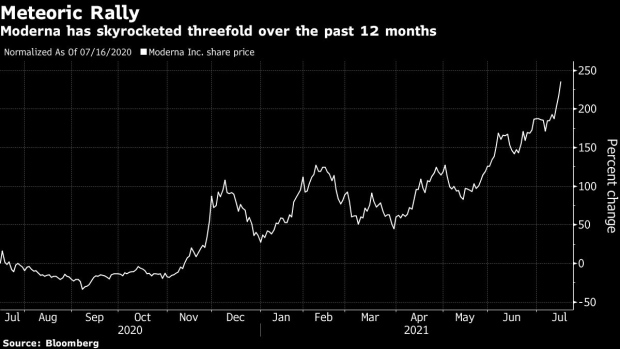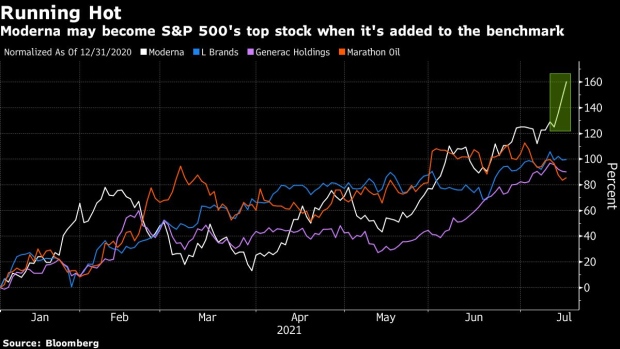Jul 16, 2021
Moderna surges as S&P 500 inclusion boosts vaccine maker
, Bloomberg News
Ontario needs a vaccine passport mandate by this fall: Toronto Region Board of Trade CEO
Moderna Inc. jumped to a fresh record after S&P Dow Jones Indices said late on Thursday it plans to add the company to its benchmark index next week.
The COVID-19 vaccine maker rallied 10 per cent to US$286.43 Friday, the biggest move since March 31, as the company will replace Alexion Pharmaceuticals Inc. in the S&P 500 Index before the opening of trading on July 21. U.K. drugmaker AstraZeneca Plc’s roughly US$39 billion deal for Alexion is set to close on the same day.
Moderna shares have skyrocketed more than threefold over the past 12 months with its coronavirus inoculation getting emergency use authorization in the U.S. in December, just a week behind the first approval for Pfizer Inc. and BioNTech SE’s vaccine. Earlier this week, its market valuation surpassed US$100 billion, putting it in an elite group of biotech firms of that size.
As an innovator breaking new ground in messenger-RNA, the stock is viewed as the “Tesla of Biotech,” according to Michael Yee, a Jefferies analyst. Moderna is expected to boost its 2021 revenue guidance when the company reports second quarter results, likely in August, he said raising his share price target to a Wall Street high of US$250 from US$170, according to a report published Thursday.

Moderna is entering the S&P 500 after reporting only one quarter -- its most recent -- of profitability as a public company.
S&P 500 criteria
One of the requirements for inclusion in the index is that a company’s most recent quarterly earnings as well as the sum of its trailing four quarters’ earnings must be positive. Before Moderna’s COVID vaccination was authorized it was still a development stage biotech with no products to sell.
In the past, the S&P 500 selection committee has often waited for more than one quarter after a company had met its earnings criteria to include a large cap stock in the benchmark. For instance, Tesla Inc., the largest company ever added to the S&P 500, became eligible for inclusion after reporting second-quarter earnings in July 2020, but was not added until Dec. 18 after an additional quarter of profitability.
Managers of index mutual funds and exchange-traded funds, who either track the S&P 500 or use it as a benchmark, could be looking at selling shares of other stocks listed on the gauge in order to add Moderna shares, potentially further propelling its gains this year.
The drug developer has rallied over 165 per cent so far this year, making it the top-performing stock on the Nasdaq 100 Index. Its meteoric rally thus far could put it at the top spot of the S&P 500 when it joins next week. The current best-performing stock on the benchmark is L Brands Inc., with a 96 per cent surge.
Moderna’s rise as a vaccine leader against the coronavirus pandemic and its addition to the S&P 500 may remind biotech specialists of Nektar Therapeutics, which was added to the benchmark despite not bringing a drug to the market. The San Francisco-based company’s market value topped out at roughly US$17.5 billion in 2018, a fraction of Moderna’s, and spent a mere 18 months on main gauge after disappointing results for a breast cancer drug and a manufacturing snafu hammered shares.
Moderna didn’t respond to requests for comment.

Stephane Bancel, Moderna’s chief executive officer, sold US$4.6 million of shares earlier this week, company filings show. Some of those sales were under 10b5-1 trading plans that allow sales at predetermined times or prices.
The stock’s immense valuation is a point of debate with analysts as their average price target for Moderna implies a more than 34 per cent drop from Friday’s close. Their skepticism is focused an ongoing debate about the market for COVID booster shots and the fact that a late-stage study for its next product won’t begin until later this year. Investors are also eyeing early flu data expected by year-end.
The Cambridge, Massachusetts-based company has said its vaccinations are producing antibodies against the more easily transmitted delta form of the pathogen, though at a lower level than for the main virus. Moderna is also targeting new vaccines and drugs for other viruses like Zika and the flu as well diseases like HIV and cancer.




